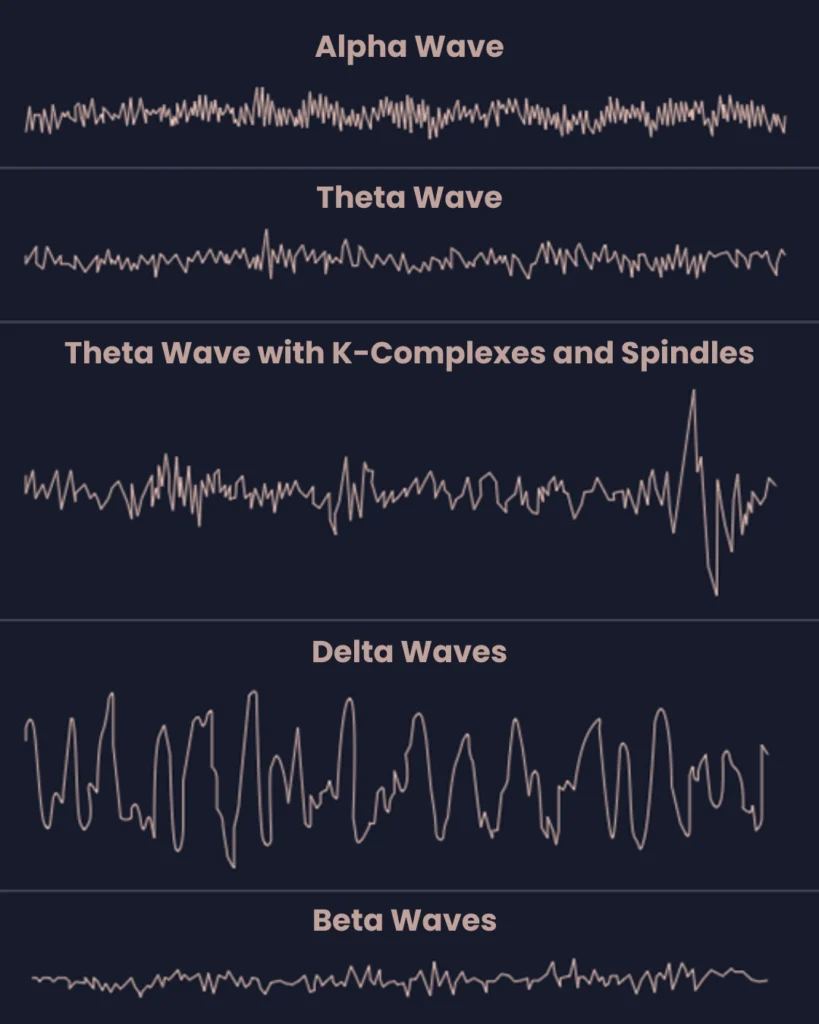10 Things You Should Know About Deep Sleep
Exploring the Benefits of Deep Sleep
1. What is Deep Sleep?
Deep Sleep (also called Slow-Wave Sleep) is the deepest stage of sleep and plays an important role in your health. During this stage (NREM Stage 3), the brain produces slow, large waves called delta waves, which occur in the 0.5-4.5Hz range.
Sleep Stages and Brain Waves
Brain waves are electrical patterns in the brain that change depending on the sleep stage you’re in. Each stage of sleep has a distinct wave pattern:

- Alpha Waves: These are seen when you’re awake but relaxed, often just before falling asleep.
- Theta Waves: Found in light sleep stages, specifically NREM Stage 1 (NREM1), they signify a transition into sleep.
- Theta Waves with K-Complexes and Spindles: These appear in NREM Stage 2 (NREM2), and are characterized by both theta waves and specific patterns like K-complexes and sleep spindles that protect sleep against external disturbances.
- Delta Waves: These large, slow waves occur during Deep Sleep (NREM Stage 3), also known as Slow-Wave Sleep, and are crucial for physical restoration, recovery, and overall well-being.
- Beta Waves: Seen during REM sleep, the stage associated with vivid dreaming.
2. How Brain Waves are Measured?
Brain waves are typically measured in sleep studies using a device called an EEG (electroencephalogram). Think of delta waves as the “signature” of deep sleep, which sets it apart from other sleep stages, and makes it the true measure of deep sleep1.
3. Wearable Devices and Sleep Tracking
Wearable devices, like fitness trackers, are becoming more common for tracking sleep. However, they aren’t as precise as an EEG when it comes to measuring deep sleep (Slow-Wave Sleep). Wearables use actigraphy sensors that track motion (how much you move during sleep) and temperature sensors. While they can give a general idea, they’re still catching up to the accuracy of medical-grade equipment. Medical grade actigraphy, with ongoing integration of added sensors, updated algorithms/AI, and other capabilities are getting closer to scoring Slow-Wave Sleep with improved accuracy2.
4. What Happens in Your Body During Deep Sleep (Slow-Wave Sleep)
During Slow-Wave Sleep, several key things happen in your body: brain waves, heart rate, and blood pressure all slow down3. This is a time for your body to take a break and restore itself.
5. The Importance of Deep Sleep (Slow-Wave Sleep)
Slow-Wave Sleep is essential for a variety of reasons3: it helps the body physically recover, recharge energy, store memories, improve learning, boost concentration, maintain hormone balance, and reduce the risk5 of cognitive decline as you age.
6. How Much Deep Sleep Do You Need?
Deep Sleep (Slow-Wave Sleep) is crucial for both the brain and body to repair and refresh. The more Slow-Wave Sleep you get, the more restored you’ll feel. On average, adults should aim for at least seven hours of total sleep each night to ensure enough deep sleep3 for overall health.
7. Aging and Deep Sleep (Slow-Wave Sleep)
As people age, they may notice that they have trouble staying asleep, and their sleep tends to be more fragmented. This leads to shorter overall sleep duration, and a reduction in Slow-Wave Sleep duration. Studies4 have shown 20-year-olds spend on average 20% of their total sleep time in Slow-Wave Sleep and 60-year-olds spend 10% of their total sleep time in Slow-Wave Sleep. Lack of Slow-Wave Sleep is associated with a higher risk of conditions like dementia5. This makes it even more important to prioritize deep sleep, especially as we get older.
8. Lifestyle Changes to Boost Deep Sleep (Slow-Wave Sleep)
Making lifestyle changes can help increase the amount of Slow-Wave Sleep you get. This includes setting aside enough time for sleep, engaging in vigorous exercise early in the day, making adjustments to your diet, and warming up your body before sleep. Also, practicing good sleep hygiene can be key: try to avoid blue light from screens before bed, keep your room dark, steer clear of caffeine and large meals close to bedtime, manage stress, and keep a regular sleep schedule6.
9. Techniques to Enhance Deep Sleep (Slow-Wave Sleep)
Other techniques that might help promote Slow-Wave Sleep include cranial electrical stimulation (CES)7, directing low-intensity electrical current via a pair of electrodes attached to the head and auditory/video stimulation
10. The FREQUEN-ZZZ Device for Improving Deep Sleep (Slow-Wave Sleep)
Kunasan’s FREQUEN-ZZZ neuromodulatory device is clinically proven to increase Slow-Wave Sleep by as much as 44% in a randomized control study9.
Supporting References:
1 Spatio-temporal properties of slow-wave sleep
2 Actigraphy devices for sleep-wake monitoring
3 Slow Wave Sleep: Neurolaunch
4 Meta-analysis of quantitative sleep parameters from childhood to old
5 Decreased Slow-Wave Sleep increases risk of dementia
6 What Is Sleep Hygiene? Tips To Improve
7 CES improves slow wave sleep in collegiate population
8 Auditory deep sleep stimulation in older adults at home: a randomized crossover trial
Talk to us
Have any questions or would like to get in touch? Email us at [email protected] or write us a message below and we will get back to you shortly.
